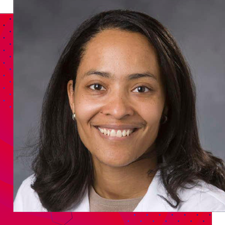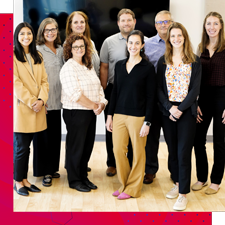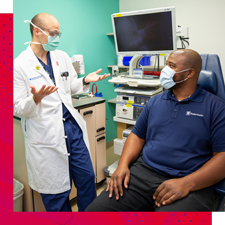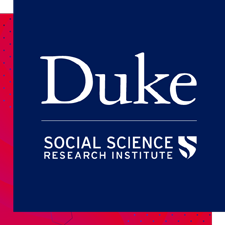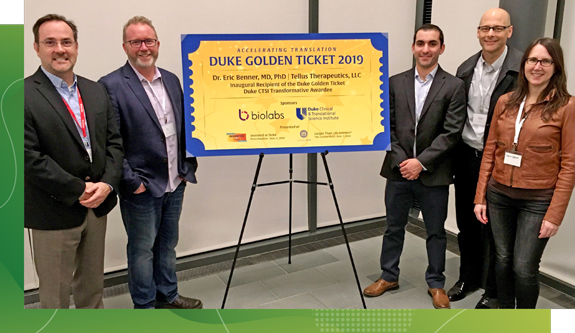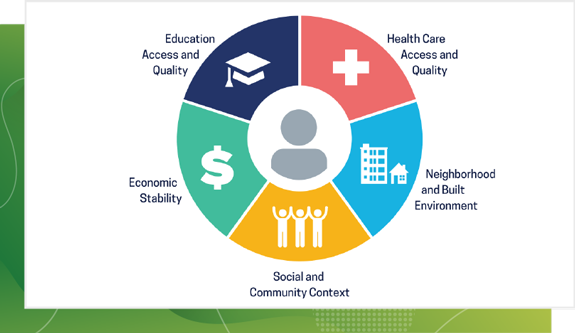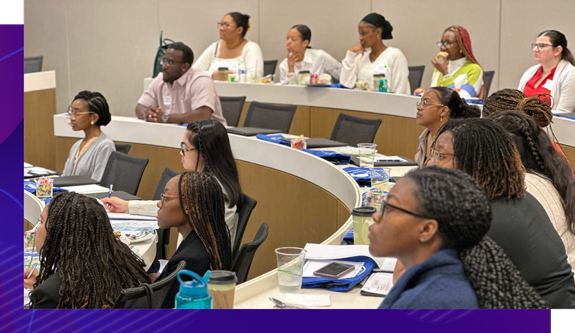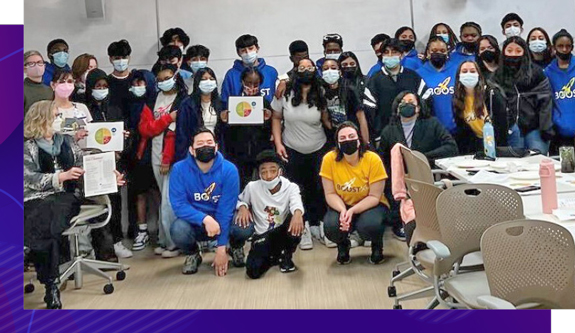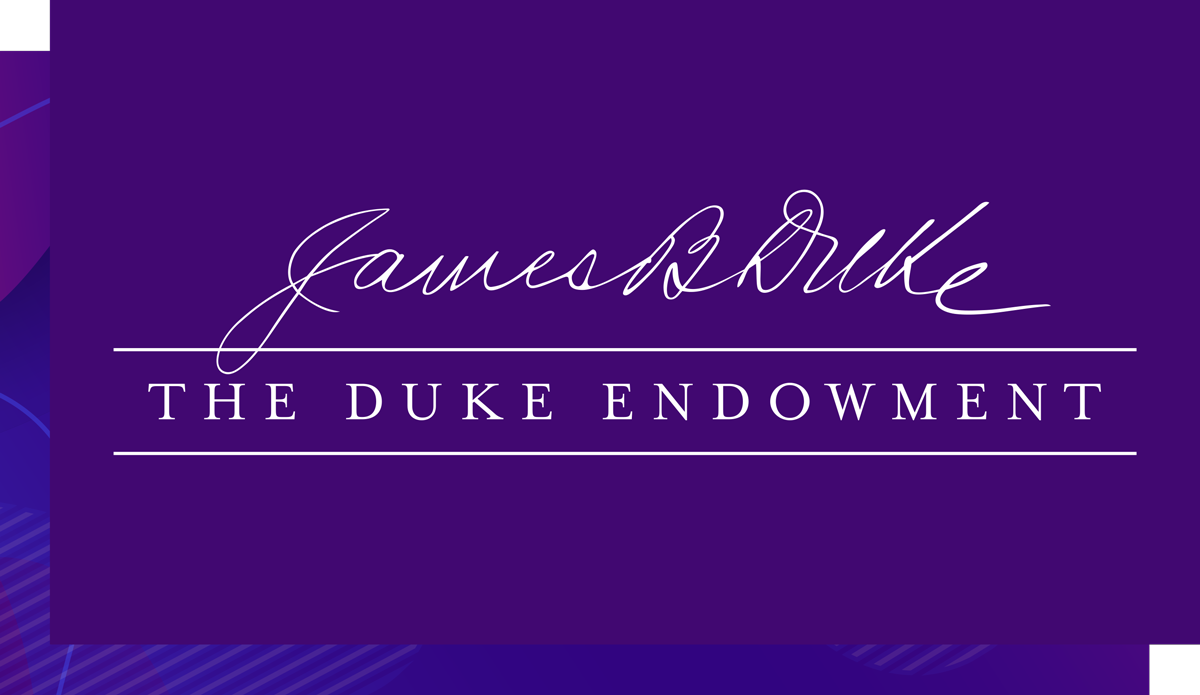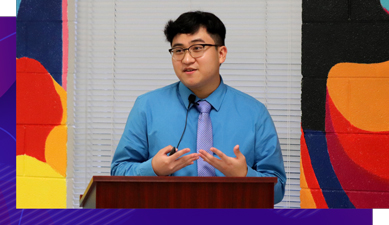
Message from the Director
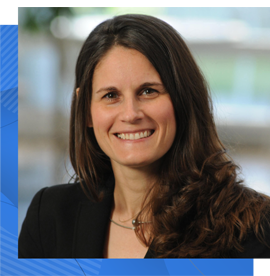
Duke CTSI embodies the future of health research—one that's inclusive, innovative, and impactful. Barriers exist in translating discoveries into real-world solutions, and advancements often do not reach all communities equitably. We are motivated to remove those barriers and accelerate research that improves health and achieves health equity for all. We rely on the expertise of our collaborators and partners, who span academics, community, government, and industry, as we work to cultivate a vibrant, diverse research community and better health for all.
We at CTSI are dedicated to creating a deeper connection between groundbreaking medical research and the communities we serve. For too long, clinical research has been marked by mistrust, bias, and lack of diversity. Through our partnerships and collaborative community initiatives, we are working to ensure that clinical research is representative and benefits everyone. We want every community member to see themselves reflected in our research workforce and our study populations so that the benefits of the work that we do are directly translatable to their health.
Partnership is a unique focus for the CTSI, and we seek to strengthen existing relationships while building new ones to extend our resources, support, and expertise across and beyond Duke. We value our partners, who enrich and inform our experiences, our perspectives, and our research.
With our partners, we can:
-
Identify and break down barriers through trusted, effective, respectful, and bidirectional engagement of our communities, patients, and collaborators.
-
Create inclusive and innovative research programs leveraging partnerships within our communities statewide to improve health and health equity across the lifespan.
-
Develop and sustain a vital and diverse translational science workforce.
-
Foster a vibrant, transparent, and trustworthy research environment benefiting all.
-
Create and promote a culture of inclusion throughout all aspects of clinical and translational science at Duke.
Our 2023 Impact Report details how these partnerships accelerate scientific discovery, innovation, and translation in ways that are aligned with our vision to improve health and achieve health equity for all.
Sincerely,
Susanna Naggie, MD, MHS
Professor of Medicine
Vice Dean for Clinical and Translational Research
Director, Clinical and Translational Science Institute
Duke University School of Medicine
Duke Clinical Research Institute
Back to Table of Contents

Section One: Engaging our Partners in Research
Our partners bring essential experiences, expertise, and energy to the research enterprise at Duke. We value their insights, perspectives, and novel approaches to the unique challenges related to capacity, funding, infrastructure, and equity faced by our academic, clinical, and community organizations.
North Carolina Central University (NCCU) Partnerships
More than five years into our partnership with NCCU, this remarkable collaboration has generated many successes, most notably the development of the Duke-NCCU Bridge Office, which serves as a linchpin and catalyst for the continued growth of this relationship.
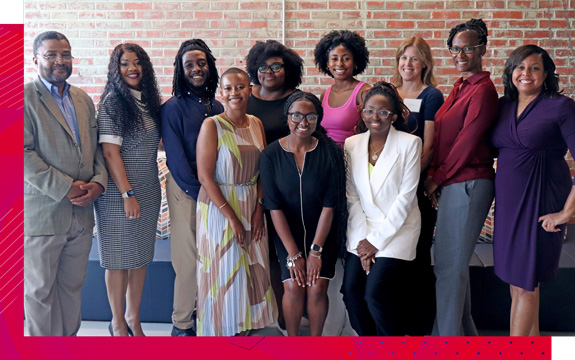
NCCU Students Gain Valuable Clinical Research Experience
The Duke-NCCU Bridge Office enriches education and workforce development opportunities for NCCU trainees and underrepresented minorities and advances clinical research through an internship program made possible by strong partnerships. Housed in the CTSI, the Bridge Office collaborates with partners across Duke to provide NCCU students with work experiences in Duke offices and clinical research spaces, connections to professional development resources, matchmaking with mentors, and individualized coaching. In 2023, 18 interns worked at Duke Psychiatry & Behavioral Sciences, DCRI Government Trials and Networks, and DCRI Research Communications and Engagement. In total, 30 interns have completed the program since it began in 2022.
“The internship program gave me the opportunity to work with research scientists within my field of interest. It's been integral to my success as a student, and to my future endeavors.”
— Deanna Floyd, NCCU psychology student and Duke-NCCU intern
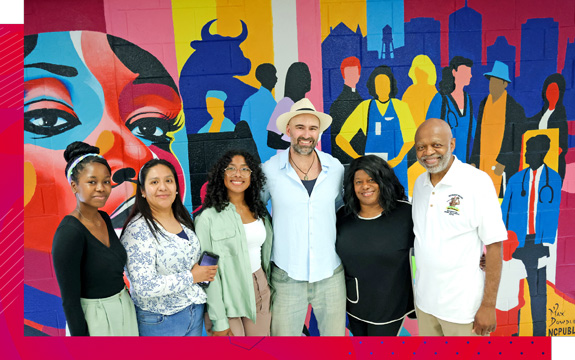
Colorful Mural Highlights Duke’s Commitment to Community-Engaged Research
A stunning mural transformed a 34-foot wall at Duke Research at Pickett Road clinic into a work of art that symbolizes the mission of the Research Equity and Diversity Initiative (READI), a large effort focused on collaboration and engagement with the local community on health research that is important and relevant to people’s lives.
Part of the Duke CTSI and funded by The Duke Endowment, READI seeks to improve health and advance health equity by making it easier for community members and researchers to work together on relevant health research. This community-based approach relies on the guidance and advice of the READI Community Advisory Council, which includes study participants, healthcare providers, patients, and community and faith leaders. Through this essential collaboration, READI is working to ensure trust in research and increase broad representation in research participation and workforce.
Key highlights in 2023 included:
-
The Research@Pickett Community Outreach and Engagement Voucher Program, designed to build capacity for research projects to maximize their impact.
-
The development of a Community Based Research Network (CBRN), which will engage community-based clinics, primary care organizations, and Durham Regional and Duke Raleigh hospitals.
-
Community outreach and educational events for all ages.

New Center for Precision Health Aims to Transform Patient Care
The new Center for Precision Health is a collaboration between CTSI and the Precision Genomics Collaboratory that works to harness the power of genomic, biomarker, and health data to transform patient care and population health. The center will serve as a foundational network for coalescing the Duke scientific community, including the Duke Health System and departments within the Duke University School of Medicine.
Led by Director Svati H. Shah, MD, MHS, the center has strong ties to Duke AI Health and will use multi-disciplinary teams and highly collaborative science to unite many aspects of precision health, focusing on research that impacts Duke patients.
“This collaborative effort will bring together researchers from across Duke that will enable us to improve patient care and help move more discoveries in basic and translational research into clinical care. The Center for Precision Health is poised to become a powerhouse for genetic and genomic discovery, outreach, and education. I’m excited to see what the future holds.”
— Mary E. Klotman, MD, executive vice president for health affairs and dean of the School of Medicine
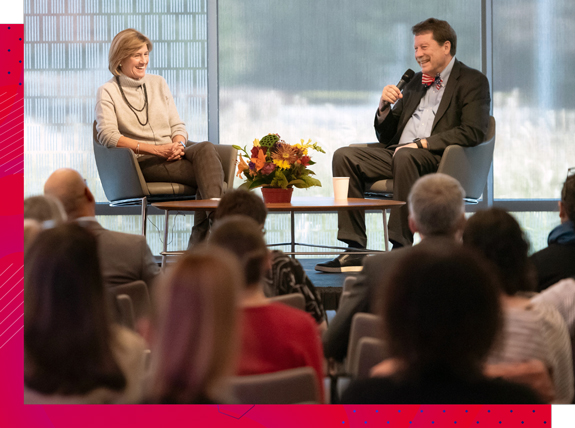
Duke Co-Hosts National Forum on the Role of Health Professionals in Responding to Misinformation
The spread of inaccurate information related to medicine and health has been a persistent concern throughout American history. Duke CTSI, Duke School of Medicine, RTI International, and the Coalition for Trust in Health and Science collaborated to develop a national forum to respond to this need.

Section Two: Accelerating Research Innovation
Duke is a national leader in health informatics, data science, and AI, and Duke CTSI is a primary resource for these efforts in collaboration with Duke AI Health. As the academic research and community engagement lead for the nference partnership, CTSI serves as a liaison for Duke faculty and the community to invest in research innovation.
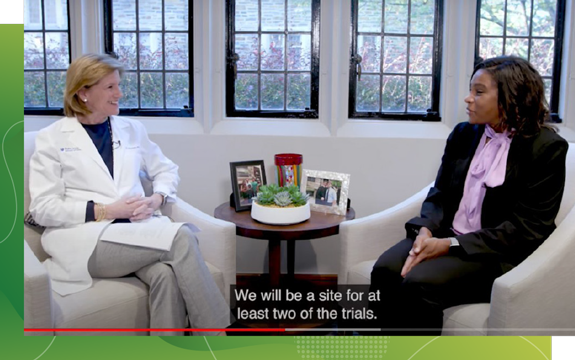
CTSI Leaders Discuss Impact in Dean’s Video Series
As part of her ongoing Friday Message video series, Duke University School of Medicine Dean Mary Klotman, MD, hosted many CTSI leaders in 2023 to talk about the impact of their work — and Duke’s work more broadly — on health and health equity. The conversations covered artificial intelligence, vaccine research, health care access in underrepresented populations, medical misinformation, and more. Enjoy the videos, which start as the conversations with the Dean begin.
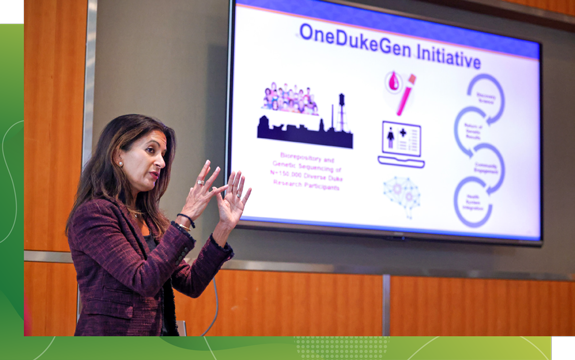
OneDukeGen will Analyze DNA from 150,000 Duke Patients
When heart transplant patient Roger Neighborgall learned about OneDukeGen during a recent checkup, he jumped at the chance to join the precision medicine study that will analyze DNA from 150,000 consented Duke patients and study participants.
As a part of the new Center for Precision Health and in partnership with software company nference, OneDukeGen aims to unravel the intricate connections between genetics, health, and disease by integrating comprehensive genomic data and health information to foster a deep understanding of hereditary disease susceptibilities.
“OneDukeGen is focused on using genetic and other scientific discoveries and translating them to patient care in less time. Because of participants like Roger, we will be able to make discoveries to improve prevention and treatment of diseases and enhance health.”
— Svati Shah, MD, MHS, principal investigator for OneDukeGen

CTSI Pilot Award Helps Researchers Develop New Intervention for Stroke Patients
Bruce Sullenger, PhD, and his lab received the Duke CTSI Transformative Award in 2018. Since then, Dr. Sullenger and his team have been developing a more potent, rapidly reversible antiplatelet agent for patients suffering from acute ischemic strokes. Earlier this year, the team presented successful results from their phase I clinical trial, indicating that their thrombolytic proves to be safe and effective in humans.
“It’s tough to raise money for studies like this, and the CTSI support was vital for getting us through the translational valley of death.”
— Bruce Sullenger, PhD, Joseph W. and Dorothy W. Beard Distinguished Professor of Experimental Surgery
Biorepository Transformation Initiative Accelerates Research
The MURDOCK Biorepository Transformation Initiative continues to accelerate health research and discovery by providing Duke investigators with biospecimens annotated with longitudinal data from participant surveys, electronic health records, and population-based datasets. The science-forward initiative, announced in May 2022, has helped investigators across Duke, including the following:
-
The ease and speed of obtaining samples and data helped to accelerate a heart failure discovery by Duke researchers in the Department of Pathology.
-
Duke researchers in the Aging Center found more evidence linking the disruption of a key metabolic pathway with the development of Alzheimer’s disease.
-
Aging Center researchers also identified new indicators of fracture risk among older adults with type 2 diabetes.
Samples in inventory include plasma, serum, whole blood, and urine. Interested Duke investigators should act now and complete this brief interest form as a first step toward tapping into the Biorepository Transformation Initiative.

Section Three: Investing in the Workforce of the Future
Investment now in the recruiting and training of a diverse research workforce will produce the next generation of highly skilled clinical and translational scientists and research team members who will bring needed change and insightful perspective to our research enterprise.

Duke READI, Community Partners Host Youth STEAM Event
A community outreach event hosted by the Duke Research Equity and Diversity Initiative (READI) brought together middle and high schoolers with speakers and resources from across Durham and Duke to learn about clinical research and careers in STEAM — science, technology, engineering, art, and math.
At the half-day event, students ages 11 through 14 learned about a range of STEAM topics, from the evolution and global impact of hip hop to the equitable use of artificial intelligence in health care, an introduction to clinical trials using quilting techniques, and how to build video games.

Four Students Complete Clinical Research Equity Scholars Program
Duke CTSI partners with Durham Technical Community College on the Clinical Research Equity Scholars program, which provides Durham Tech students the opportunity to participate in skill-building training activities to integrate equity in clinical research operations and promote diverse representation in clinical research participation, gain hands-on experience working with clinical research teams, and work to address disparities in clinical research by engaging with communities that are underrepresented in clinical trials. In 2023, four students graduated from the program's second cohort.
